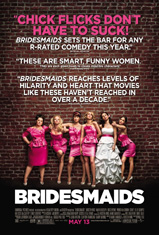
 Bridesmaids has gotten praise far and wide, largely comparing it to The Hangover (for women), the most common move in advertising today. Everything is compared to The Hangover because... I don't know. Why is it always The Hangover? It was a passable and amusing comedy, but the constant hype and overestimation of the importance of the film has led to me hating the movie's very existence. "The funniest movie since The Hangover" isn't an impressive statement, even less so when it was being used mere months after the movie's release. And, again, we have a case of a film being drastically overhyped, both in comparison to The Hangover and on its own.
Bridesmaids has gotten praise far and wide, largely comparing it to The Hangover (for women), the most common move in advertising today. Everything is compared to The Hangover because... I don't know. Why is it always The Hangover? It was a passable and amusing comedy, but the constant hype and overestimation of the importance of the film has led to me hating the movie's very existence. "The funniest movie since The Hangover" isn't an impressive statement, even less so when it was being used mere months after the movie's release. And, again, we have a case of a film being drastically overhyped, both in comparison to The Hangover and on its own.
What Bridesmaids actually is is fairly unoriginal; it follows the same beats and treads in the same steps of most friendship and romantic comedies that have come before it. The major difference in this case is that the protagonist and her friends and foes are all women.
A sad woman, played by Kristin Wiig, has a best friend, played by Maya Rudolph, who gets engaged. She, of course, will be her friend's maid-of-honor. But her friend has another friend, the rich wife of her future husband's boss, who seems perfect in every way. This woman, played by Rose Byrne, takes over more and more of the wedding and her friend's attention as everything Wiig's character does falls apart. It breaks into all-out war between the two and the friendship between bride and maid-of-honor is torn asunder until everyone ends up friends again at the end. It begs and borrows bits from every comedy, like Wedding Crashers, as well as a wealth of romantic comedies with cliched plot points throughout. There's a rare laugh, but the occurance seems to happen too rarely, much the movie being downbeat and depressing.
Not as relying as heavily on the comedy of awkwardness (something I loathe) as some of its movie bretheren, the film has a sad tone to it; somehow the flawed, schmucky protagonist doesn't seem quite so pathetic when it's a guy. Probably because, while dim-witted, the guys usually don't go out of their way to appear as sadsacks who let the world trample them. Wiig, having written the film, obviously knew what she wanted out of the character and it was apparently not to like her or find her funny as much as just pity her. Wiig is a cute woman. Maya Rudolph is generally likable, especially on her new TV series "Up All Night". These are women that are funny and, in some scenes, that shines through, but much of this movie owes silliness and hype for its success.
The cloying story plays out as it should, and Wiig even finds a man along the way. Her and the queen of all bitches, Rose Byrne, even become friends. Sometimes, it almost felt like "Light Comedy Mad Libs For Women".
I was kind of hoping Rose Byrne would show some comedy chops in this film, as I love her as a dramatic actress. Sadly, she was relegated to the role of straight woman, though I was glad to see Wendi McLendon-Covey, whose career has been far too quiet since "Reno 911!".
All in all, I feel like the components may have been there for a successful comedy, but the movie either played it too sad or too cliched or too similar to everything else to make an impression. A few laughs about women hitting each other in the tits with tennis balls hardly make up for what was, otherwise, a kind of depressing experience. Some will think the movie is great, but I can't imagine what they're seeing that I'm not.
